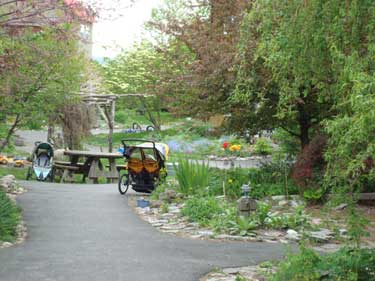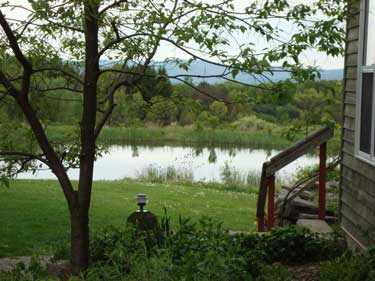Liz Walker
While the Ithaca EcoVillage has grown to become a huge success, Liz admits that there were some hopes and expectations that have not yet been fulfilled. However she leaves these projects to the future and continues with great determination to better their community as much as possible. Many areas are still currently expanding while others will have to wait until later on.
Two of the main projects she mentioned they would like to see introduced to the ecovillage include education centers and a natural cemetery. Ecovillage residents have all learned a great deal as they've created their community. They have discovered how to communicate effectively and resolve conflicts. Living with a large group of people can easily arouse conflict and crises are bound to happen. People graduate, get married, have children, go through divorces and lose lives. The community acts as a family when it comes to these events. At these times, they provide their love and support and help each other through it. The community admires their new generations and aims toward bettering their future. They look toward expanding the village's mission with an education center as a way to do this. They would like to have on-site centers to school children and further their educational needs. Creating a natural cemetery was important to Liz. She said that they would like for people to be able to age with the community and give them a chance to rest there after they pass as well. She mentioned also wanting more accessible and affordable housing. Accessibility can also benefit the elderly regarding use of wheelchairs and walking the steps to get into homes and around the site. However, as a whole community and for all of the members regardless of age this can also be improved and become more effective. Other dreams for the future of ecovillage include village-scale wind power, organic orchards, roadside farm stands, onsite biological wastewater treatment, greywater recycling, biomass energy crops, and onsite biodiesel/vegetable-oil fuel production.

Funding was an obstacle at the beginning of the ecovillage project so Liz believes it would also be beneficial to look to other ways to bring in more money and funding. She wants to spread the word around the country and throughout the world about ecovillages and to encourage others to help preserve our planet. She does this in some measures currently but would like to expand even further. She provides interviews to various radio stations and does many appearances to teach about the fundamentals of creating a sustainable community.
She has also written a book titled EcoVillage at Ithaca, Pioneering a Sustainable Culture. Through this she is able to give insight to life in an ecovillage. She includes personal stories and experiences she has been through so far in here years living in this setting. She shares stories explaining how people reach out to one another in times of need. As an example, Liz tells the story of two women who became pregnant and held a “Blessing Way.” With this some of the women gathered together, they called in the spirits, and played special music. The other women present offered blessings to the mothers. A necklace was made for each mother with special beads on it. Through her writing and our discussion, Liz seems very involved in the community and with the people around her. She appears to be greatly admired and a part of many of the lives in the community. This is further demonstrated in her mentioning of a death within the ecovillage. A woman passed away of cancer and Liz would often visit her. Not everyone has seen someone die but in the ecovillage there was an openness about it. Having this experience may have furthered Liz’s hopes for a natural cemetery on-site. She has truly provided great inspiration to the EcoVillage and all of the members living there but is somehow been able to balance her entire life around it.
